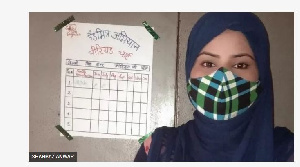Why women dey stick period date charts for doors inside India?

“Some time ago I put one date chart for my door, to inform di household about my periods.
“Wen my papa and brother see am, dem feel a bit awkward at first. But now dem don get used to am,” Alfishan tok.
She no dey alone. plenti of oda women for her city dey do di same.
Alfishan dey live for di North Indian city of Meerut, 100km west of New Delhi.
For many parts of South Asia di monthly cycle remain one taboo subject.
For some rural and tribal communities, dem still dey by force menstruating women to live for secluded places and use separate eating utensils.
Display of period charts
All dis practices don become less commonplace as time dey go.
Now, campaigners dey encourage women to dey open about dia periods by displaying chart wey go show wen dem dey menstruate.
Alfishan say e don already work wonders for her.
“Women get many problems during periods. Dem dey show irritability, weakness and get many oda palava.
But since I put dis chart inside di house, everyone don get to know di date of my periods.”
Di hope be say, her openness don make odas – particularly men – dey more sympathetic to her needs.
Emotional support
Alima na anoda project participant.
Di teacher say afta she reveal her period dates to all seven members for her household, she get more emotional assistance than before.
“I know di problems wey working woman gatz to go through during menstruation.”
“By being open about am, we get more support from home. Dis na very pleasant experience,” Alima tell BBC.
She also dey live for Meerut, one city of almost two million pipo.
About 70 women – both married and unmarried – don enroll for di scheme.
‘Selfie with Daughter’ campaign
So how dis new openness take come about?
Sunil Jaglan, director of di non-governmental organisation ‘Selfie with Daughter’ Foundation, help ptomote di drive to show period dates.
Di Meerat period campaign begin for December 2021 by plastering posters around di city.
“I often used to think about di problems wey women dey face during dia periods.
“I used to see many female members of my home with problems due to dis.
“I come dey think say I need to do something about am. Afta speaking to doctors I start dis campaign,” Sunil Jaglan tok.
Di charts first come up for some villages inside Nuh and Jind districts of Haryana.
Since then, di campaign don spread to seven Indian states, with around 1,000 women wey now dey participate for di campaign.
‘Indecent comments’
Volunteers dey use phones, social media and door-to-door campaigns to encourage more women to open up about dia periods.
Dem enjoy success at times, but encounter strong resistance oda times
“Pipo dey make indecent comments about women – even about dia daughters.
For many places dem dey either tear dis charts down, or girls no dey allowed to put dem up in di first place,” Jaglan tok.
Like many places for North India, Meerut na socially conservative place and e dey difficult for women to defend demsef for home.
Di group look for and receive di support of religious leaders to smooth di opposition.
Extended family pressures
Social structures also dey slowed di project down.
Aaliya na housewife wey dey live for extended family – dis dey create extra challenges.
“Apart from my husband, my brother-in-law, father-in-law and many oda male relatives wey continue to visit di house.
So, wen I first come to know about di period chart, I think say e no go dey possible for my home.”
Her husband support di idea and also make sure say im mama dey join support too.
Now, Aaliya don dey get more support from oda members of di household during her periods.
Period poverty
Manisha – anoda chart project participant – feel say dis don make am possible to tok about menstruation with male family members without any palava.
“Dis thing dey related to our health. Everyone for di family suppose know about our problems during menstruation.
“Women often get irritable and argumentative during menstruation. By knowing di health issues wey dey under dis, pipo dey more sympathetic.”
One Indian goment survey wey dem publish for 2019 show say most Indian girls and women still dey use unhygienic sanitary methods of protection during dia periods.
Some of di methods na old clothes. Many dey too poor to buy sanitary napkins.
For recent years, locally made cheap sanitary napkins don dey able to provide some comfort to those wey dey suffer from period poverty.
But taboos wey dey associated with periods don also prevent women from going into shops and asking to buy menstrual hygiene products.
‘No such thing as shame’
For years, Alfishan mama used to buy sanitary products for her and hide dem for black plastic bag.
“I used to dey ashame to buy pad from di shopkeeper, but now I fit go and buy am for myself. No such thing as shame again,” she tok.
Di participants dey too small to show any social change. wetin dey give hope to Jaglan na new converts among men like Zubair Ahmed.
Di barber det actually encourage im wife to put up di chart.
E tell her she fit hang di chart on any door for dia home.
Zubair get one message of support for men and women alike.

“Women no need to dey stressed during dia period. Women no need to bother about wetin someone go think about am and suffer in silence,”
Source: www.bbc.com






